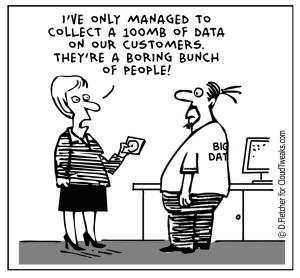I caught a really interesting programme a few weeks back on Radio 4's PM about the Chinese governments plans to give every citizen a 'social credit score' by the year 2020. In fact this seemingly ambitious goal is very much on track with groundwork by Ant Financial, a subsidiary of the Chinese e-commerce company Alibaba, which has created a system which assigns users a score out of 950 based on their credit history and social media presence. Whatever your view of this development, the truth is that every day we are generating a tidal wave of data, from scanning your card at the supermarket, posting on social media sites to streaming a movie....… the list is endless, and it is this huge amount of data is making projects such as China's social credit score a possibility. Cue the buzzword 'Big Data'; which according to IBM is extremely large data sets that may be analysed computationally to reveal patterns, trends, and associations, especially relating to human behavior and interactions.
So, how big is big data? Scratch the surface and the figures are quite astonishing. A study in 2013 by research group IDC predicted the digital universe will reach 40 zettabytes in size – that’s 45 trillion gigabytes – by 2020. That’s a 50-fold growth in just one decade. So, essentially big data is concerned with the collection, analysis and interpretation of data from this huge, multi-dimensional numeric world. Yet, according to IDC, less than one per cent of the world’s data is currently being analysed.
Big data underpins every major sector; from investment banking to healthcare to education. In fact according to the LSE Careers Service, the majority of big data jobs are found in the finance, marketing, banking/investment banking, retail and games industries. Big names in big data include IBM, SAS, Dunnhumby, Google, Amazon, SAP, Price Waterhouse Coopers, Accenture, British Airways, Sopra Group, Barclays, Amadeus Software, Aviva, Base 3 Systems Ltd, Capital One, CSP, Department for Work and Pensions, Nationwide Building Society, Office for National Statistics and HM Revenue & Customs, RWE nPower, HSBC, The Home Office… plus many, many more!
So what does this mean if you are a current student or graduate? Well, we can expect to see a rise in 'Data Scientist' jobs for a start. In fact, McKinsey is forecasting that the US will face a shortage of up to 190,000 data scientists by 2018. The evolution of the Internet of Things (IoT) will also play an interesting part in the employment needs of big data employees as more specific personal data is produced (especially linked to human behavior, advertising and purchasing). Therefore we can assume the boom in big data jobs will not just be limited to engineering, technology and maths. According to Computer World, big data employers aren't simply looking for technical skills or academic degrees. Rather, they seem to be after soft skills such as: a curious mind, the ability to communicate with non-technical people, a persistent, even stubborn - character and a strong creative bent.
Whilst we don't quite know the full extent of job opportunities that will arise as a result of big data, you can take control of managing career by striving to gain relevant skills and by staying plugged into market developments. How do you do this?
- Self-awareness: yes, that old chestnut! It is important to seek feedback from others and proactively identify opportunities for personal growth. This can be by attending a coding course, doing a MOOC or learning a language. You can take advantage of extra-curricular activities on campus to develop the soft skills employers value.
- Exploring & creating opportunities: it is important to shift from 'looking for advertised' opportunities to a mindset where you create, investigate and seize opportunities. This means networking - attending employer events, talking to alumni and going to talks that may be outside of your field of study.
- Being flexible: This is about having the flexibility to apply your skills into new contexts especially in light of a rapidly changing labour market.
Check in on tomorrow when we will blog about the career opportunities this presents!
Respond

